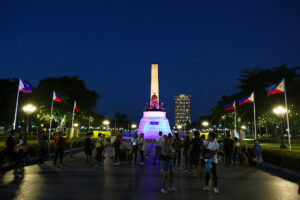




January Economic Update: Growth slows, prices rise
 DOWNLOAD
DOWNLOAD

Inflation Update: Up, up, and away?
 DOWNLOAD
DOWNLOAD

Quarterly Economic Growth Release: Growth takes on a slower pace
 DOWNLOAD
DOWNLOAD


EU business groups optimistic of more investments in PHL

THE Philippines is expected to attract more European investments, as the Regional Comprehensive Economic Partnership (RCEP) enters into force next month.
“We are now seeing positive developments from the economic team under President Marcos Jr. that will surely improve the standing of the country as a destination for foreign direct investments (FDIs) from Europe. Being part of the RCEP will be significant benefit to the country,” European Union-ASEAN Business Council (EU-ABC) Executive Director Chris Humphrey said during a press conference in Makati City on Monday.
He noted the Philippines has one of the fastest gross domestic product (GDP) growth rates in the region, as well as recent economic reforms conducive to foreign investments.
The Philippine government is targeting 6-7% GDP growth for 2023.
The RCEP trade deal is expected to take effect for the Philippines on June 2. The RCEP participating countries include the 10 members of the Association of Southeast Asian Nations (ASEAN), Australia, China, Japan, New Zealand, and South Korea.
“We see, at the council, huge potential for growing FDI into the Philippines from Europe, and for increasing trade relations,” Mr. Humphrey said.
Lars Wittig, European Chamber of Commerce of the Philippines (ECCP) president, said that the Philippines should further leverage its status as the only ASEAN country beneficiary of the Generalized Scheme of Preferences Plus (GSP+) trade scheme.
“Certainly, there is much opportunity for Europe and the Philippines to strengthen their economic ties, especially in line with their longstanding trade and investment relations,” Mr. Wittig said.
The GSP+, set to end by the end of the year, is an incentive arrangement that allows the Philippines to avail zero tariffs on 6,274 products or 66% of all EU tariff lines.
However, participating countries should commit to 27 international conventions related to human rights, labor, good governance, and environment in order to avail of the GSP+ benefits.
The ECCP also supports the push for a free trade agreement (FTA) between the EU and the Philippines, which is “crucial for the Philippines to become a magnet for European investments,” Mr. Wittig added.
The last round of negotiations for the Philippines — EU FTA happened in 2017 after talks officially began in 2016.
Meanwhile, Trade Secretary Alfredo E. Pascual said the Philippines is keen on restarting the FTA negotiations with the EU.
The ECCP and the EU-ABC will hold the 2023 European-Philippine Business Dialogue on May 25 at Dusit Thani Manila. — Revin Mikhael D. Ochave
This article originally appeared on bworldonline.com





 By BusinessWorld
By BusinessWorld